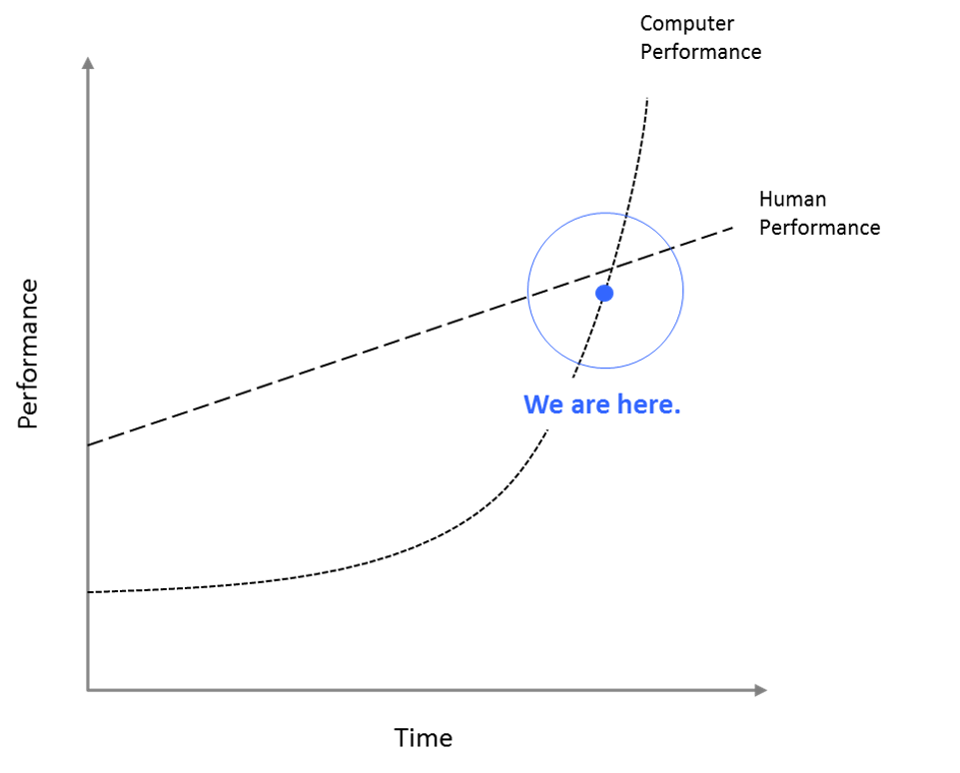Artificial intelligence is a branch of computer science that aims to create intelligent machines that teach themselves. Much of AI’s growth has occurred in the last decade. The upcoming decade, according to billionaire investor Mark Cuban, will be the greatest technological revolution in man’s history.
copyright by www.forbes.com
 More progress has been achieved on artificial intelligence in the past five years than in the past five decades. Rapid machine-learning improvements have allowed computers to surpass humans at certain feats of ingenuity, doing things that at one time would have been unfathomable. IBM calls the autonomous machine learning field ‘cognitive computing.’ The ‘cognitive computing’ space is bursting with innovations; a result of billions of research and investment dollars spent by large companies such as Microsoft, Google and Facebook. IBM alone has spent $15 billion on Watson, its cognitive system, as well as on related data analytics technology.
More progress has been achieved on artificial intelligence in the past five years than in the past five decades. Rapid machine-learning improvements have allowed computers to surpass humans at certain feats of ingenuity, doing things that at one time would have been unfathomable. IBM calls the autonomous machine learning field ‘cognitive computing.’ The ‘cognitive computing’ space is bursting with innovations; a result of billions of research and investment dollars spent by large companies such as Microsoft, Google and Facebook. IBM alone has spent $15 billion on Watson, its cognitive system, as well as on related data analytics technology.
The Rise of Artificial Intelligence
Arthur Samuel’s checkers-playing program appeared in the 1950s. It took another 38 years for a computer to master checkers. In 1997, the IBM deep blue program defeated world chess champion Gary Kasparov. Around the time deep blue first started learning chess, Kasparov declared, “No computer will ever beat me.” That historic accomplishment took IBM 12 years.
Artificial intelligence first started hitting the mainstream headlines in 2011 when IBM’s Watson beat two human contestants on TV’s Jeopardy. This was the landmark milestone of its time, especially if you consider one of the players was Ken Jennings, who holds the record for the consecutive wins (74) on the quiz show. Getting to that moment took five years. IBM’s Watson spent four of them learning the English language, and another year reading—and retaining—every single word of Wikipedia (plus a few thousand books).
No computer was ever supposed to master the game Go, but it did. Go was invented in China in 548 B.C. It is a game of ‘capture the intersection’ played on a 19×19 grid with each player deploying a combined cache of 300-plus black and white pebbles. The possible board permutations in Go vastly outnumber the board permutations of chess. […]
read more – copyright by www.forbes.com


Artificial intelligence is a branch of computer science that aims to create intelligent machines that teach themselves. Much of AI’s growth has occurred in the last decade. The upcoming decade, according to billionaire investor Mark Cuban, will be the greatest technological revolution in man’s history.
copyright by www.forbes.com
The Rise of Artificial Intelligence
Arthur Samuel’s checkers-playing program appeared in the 1950s. It took another 38 years for a computer to master checkers. In 1997, the IBM deep blue program defeated world chess champion Gary Kasparov. Around the time deep blue first started learning chess, Kasparov declared, “No computer will ever beat me.” That historic accomplishment took IBM 12 years.
Artificial intelligence first started hitting the mainstream headlines in 2011 when IBM’s Watson beat two human contestants on TV’s Jeopardy. This was the landmark milestone of its time, especially if you consider one of the players was Ken Jennings, who holds the record for the consecutive wins (74) on the quiz show. Getting to that moment took five years. IBM’s Watson spent four of them learning the English language, and another year reading—and retaining—every single word of Wikipedia (plus a few thousand books).
No computer was ever supposed to master the game Go, but it did. Go was invented in China in 548 B.C. It is a game of ‘capture the intersection’ played on a 19×19 grid with each player deploying a combined cache of 300-plus black and white pebbles. The possible board permutations in Go vastly outnumber the board permutations of chess. […]
read more – copyright by www.forbes.com
Share this: